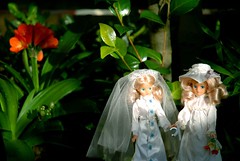When you struggle days with Excel and Windows Vista, write emails about prospects of collaboration and seek synergies between action lines, it is sometimes easy to get tangled into the whole mess and forget what actually counts in the end: love. As corny as it sounds, this was my realisation this evening. My friend Jim Lucassen had directed Gluck's dramatic opera Orfeo ed Euridice into a church in Utrecht so I headed there after work with my flatmate. And what a delight it was.
During Christmas holidays I read the latest public diary of Professor emeritus Matti Klinge, one of the true living intellectuals in Finland. In his diaries - which I do admire for their clarity of thought - he wrote several times how appalled he was when the Finnish National Opera had modernised classics such as Jevgeni Onegin. Mr Klinge would not have liked today's performance where the ancient myths were blended with references to sexual minorities and the Church. Today's adaptation of Orfeo ed Euridice was somehow closer to one of my favourite plays, Kushner's Angels in America, which tackles the Reagan years of the US. And here I need to disagree with the honourable professor.
Orfeo ed Euridice story goes something like this: Euridice dies in the beginning, Orfeo, her lover, is given a chance by Cupid to retrieve Euridice from Hades if he promises not to look at her before they get back. In Hades the Furies try to stop him. When they finally meet after all this hassle, Euridice flips, loses it, as she thinks Orfeo does not love her anymore as he does not look at her. And ta-dah, Orfeo turns, Euridice dies. In desperation Orfeo wants to kill himself but Cupid stops him and everyone lives happy together.
Well, in today's adaptation Cupid was Virgin Mary, Furies were monks or something like that and Euridice and Orfeo were both women. So there's your Kushner reference. Gays and religion in the same cocktail.
I loved the opera. It was dramatic with Euridice beating Orfeo with the wedding buoquet and all that. It ended happily with the choir singing L' Amour triumphe. Glorious, glorious.
The best part of the production - even with the cleverness of the adaptation - was however the choir. I concentrated on their faces and the excitement of the amateur opera singers was evident. The audience was diverse as I assume it consisted strongly from family members and friends. Coffee and drinks were sold by volunteers. The atmosphere was far from snobby - it was warm and excited.
I think the director had done a good deed by also thinking of the audience when building up the modernised references. The story was easy to follow and the performance had drama and entertainment without jeopardising the artistic value. Wunderbar.
MM13 Tuloerojen kasvu
1 day ago













No comments:
Post a Comment